
Julie Bergeron
Professor @ Université du Quebec en Outaouais
Other Speakers– Jrène Rahm,Geneviève Lessard,Nathalie Anwandter-Cuellar
Presentation Title: Embracing the Unknown While Exploring STEM: A Key Towards Inclusion, Motivation and Empowerment of Learners and Teachers
Abstract: Primary teacher’s attitudes and beliefs regarding STEM influences their teaching of STEM. It has been shown that while testifying to have low self-efficacy and anxiety related to STEM, teachers felt more secure when using strict, pre-planned and multi-step activities in STEM. Unfortunately, the rigid pre-planned and fully adult controlled activities in STEM literally “nurture” learners’ motivation problems, resulting in the development of negative attitudes towards STEM and considerably limit the students’ development of problem solving skills. Research has shown however, that breaking this cycle of avoidance and insecurity in STEM is possible. For instance, hands-on activities in the STEM classroom support student engagement and the development of practical sustainable strategies in STEM. Hence, we will share in images and short videos some promising practices as ways to animate engaging whole class dialogue around STEM issues with students, how to pursue open-ended questioning activities, how to optimise materiel discovery, and how to develop a community of expert-practitioners in the STEM classroom. Research suggests that these activities and strategies increase teachers’ and learners’ motivation and inclusion, making them experience science in meaningful and empowering ways. Therefore, this curriculum burst activity should inspire teachers and school advisors to explore and implement new practices in the STEM classrooms.
Biography: Julie Bergeron studied anthropology (B.Sc.), educational sciences (minor) and psychopedagogy (M.Sc. and Ph.D). She has been a professor of educational sciences at the University of Quebec in Outaouais since 2012. She is a member of the Executive Committee of the UNESCO Chair in Democracy, Global Citizenship and Transformative Education (DCMET). She is responsible for the Education Partnerships Commission for UNESCO-DCMET. She is involved in numerous research projects in national and international educational development. She is particularly interested in accessibility, motivation, psychosocial adjustment and school perseverance of marginalized populations such as children with special needs and women in science, technology, engineering and mathematics. Also interested in optimizing social and school adjustments for children, she was in charge of a cultural and intercultural committee developing learning opportunities for diverse students in underserved communities. She also developed and led a professional internship program for student teachers in Panama, engaging them in culturally responsive teaching through an authentic experience in place.